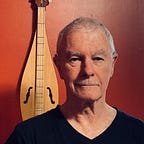Across the Great Divide: Lessons from Trump Country
On a warmth-seeking getaway last month, my wife and I left our home in Georgia and headed — no, not for the Frisco Bay. Marty and I drove down to Suwanee, Florida, a coastal community in the bend where the panhandle makes its peninsular turn to the south. We had booked a few days at an Airbnb billed as a fishing camp. We got a couple of surprises.
First, the “camp” was a trailer parked on a small lot along a grid of canals. It was about as private as a St. Pete retirement community — homes ranging from double wides to prefab bungalows to designer mansions on stilts ensconced within spitting distance each other. It did have its own little dock, though, so we had a pleasant spot for enjoying our sundown G and Ts.
Surprise №2 materialized the next morning, when we did a neighborhood recon walk. We realized we were in the thick of Trump country. Not that plenty of Georgia isn’t as well, but we live in Athens, a college town, and we suddenly realized just how deeply blue our little oasis is.
Seemed like every other residence along the canals had a “Stop the Steal” or “Trump Won” sign along with at least one gargantuan pick-up truck or SUV. And here we were in our little orange hatchback with a Unitarian-Universalist logo and a leftover Obama-Biden sticker on the back bumper. Before our first full day was up, we’d been cruised twice by guys in trucks wearing hunting camo and suspicious looks. I had a flashback to “Easy Rider.”
Nobody did more than glare at us, though, in the three days we were there. Well, there was that one guy who got out of his truck while I was gassing up our car at a service station. He stopped to read our bumper stickers, snorted, shook his head, and spit on the pavement.
The strangest incident occurred in a nice little café where we went for breakfast our last morning. We were the only two people in the place wearing face masks when we entered, which got us some curious looks, but our waitress was a sweetie and seemed happy to have some new clientele.
Only when we were outside, heading for our car, did Marty say, “You won’t believe this.”
She asked me if I had noticed the middle-age couple sitting a table next to ours. I said yeah, kind of. The woman had grumbled incessantly while the man with her, presumably her husband, had nodded in a browbeaten way and poked at his grits with a fork. They looked like neighbors of the characters on “Mama’s Family.”
“While you were up at the cash register paying our check,” Marty said, “she leaned toward him and said, ‘Did you get a look at that man sitting behind you? He’s as queer as a queer can get.’”
“She thought I was gay?” I said.
“No, she thought I was a gay man.”
I took a step back and looked at her. Marty does have very short hair, and she had recently colored a rosy streak across the front. And she was wearing flowered pants, tennis shoes and a shiny, silky jacket with a Picasso face on the back that hid her curves. Yeah, I guess she did look kind of flaming.
I suggested we go stand by the window, where they could see us from their table, and grope each other. Marty said, “No, let’s just get on the road. We don’t need to attract any more attention than we already are.”
Just a couple of miles down the two-lane highway, as we headed back toward I-75, we passed one of those roadside memorials to someone who’d died in a car accident. We pulled over to the shoulder and walked back.
It wasn’t the simple cross and wreathe you often see at shrines of this sort but, rather, a little fenced-in fantasy land with angels and mermaids and starfish and laminated photos of the departed. The young woman who had crashed on that spot had been loved deeply and is missed still. Somebody had even equipped the shrine with solar-powered lights to keep it visible after dark. It was beautiful and sad and, above all, human.
Our country is so polarized these days, it’s easy to be suspicious whenever you venture outside your bubble, easy to speculate on — and judge — people’s politics and prejudices based on nothing more than their haircuts or their shoes and the size of the motor vehicles in their driveways.
We had been visiting a part of the country where non-white faces were few and far between, where gun racks were as commonplace as mailboxes, where the more chaotic, multi-cultural American world seldom intrudes — and where people love and grieve like everybody else. I grew up in a place like that in Mississippi. I sometimes forget. I will try harder to remember.
